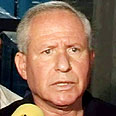
Dichter: Spain fails to distinguish terror from anti-terror measures
Former Shin Bet chief slams Madrid judge's decision to pursue legal action against Israeli officials involved in 2002 killing of Hamas leader Salah Shehade, says 'non-judicial' motives clearly at play
"Anyone who thinks Israel is a small country that can be gored is mistaken," former Internal Security Minister Avi Dichter said on Monday in response to reports suggesting Spain will pursue war crime charges against him and other Israeli officials.
Earlier, Spanish Judge Fernando Andreu said he will continue investigating seven current and former Israeli officials for alleged crimes against humanity pertaining to the 2002 Gaza bombing of Hamas operative Salah Shehade's house, in which 14 people were killed.
The seven in question are then-Defense Minister Binyamin Ben-Eliezer, former IDF Chief Moshe Yaalon, then-Air Force Commander Dan Halutz, former GOC Southern Command Doron Almog, Giora Eiland, then-head of the Israeli National Security Council and Mike Herzog of the Defense Ministry.
Defense Minister Ehud Barak said that he will appeal the decision before the Spanish government. "The Israeli army is the most ethical in the world," he said.
The Spanish, said Dichter, have failed to differentiate between terror and the counter-terror measures. "It's surprising that it is in Spain, which has suffered Muslim terror in 2004, that a judge finds it hard to tell the difference between fighting terror and what he calls 'crimes against humanity.'
"Every child know that Shehade was an arch-murderer, that he has the blood of hundreds on his hands. Unfortunately, taking him out resulted in innocent casualties, but we are fighting terrorists who use civilians as human shields."
The case was reviewed by the Israeli High Court of Justice, he added, "But I guess the Spanish judge had other, non-judicial reasons to want to ram Israel. I can't see him launch a similar investigation against US, British or even Spanish officials who took part in numerous anti-terror acts worldwide.
"Spain has nothing to do with this, nor did I hear the judge say anything about the terrorists themselves, which is absolutely absurd," he added.
Still, Dichter seemed unfazed by the news: "I was sued in this case in a US court and after three years of hearings it was dismissed, so I'm not worried – not for me and not for the State of Israel. I don't think this case will carry any diplomatic repercussions."
As for the possibility that other European counties will follow Madrid's lead, Dichter said that "Israel should deal with them on a case by case basis and stand firm. We cannot leave the (legal) arena to people who will try and use their positions to ram Israel."
The terrorists, he concluded, "should not believe for one moment that the Spanish judge will stop our hunt for them. Israel will continue to apply the same effective methods to strike justice, be it by arresting, interrogating and prosecuting them, or – in cases of greater risk – by taking them out.
"The existing ways are professional and adhere to top ethical standards, Spanish and otherwise. Israel leads when it comes to wartime ethics."
'Who are they to judge?'
Major-General (Res.) Doron Almog, called the Madrid judge decision "regrettable," saying it was an attempt to "smear Israel. The State has to defend the people who serve it, so any issues (about the operation) should be taken up with the prime minister and the defense, justice and foreign ministers."
Almog attributed the decision to the "systematic attempts to delegitimize Israel. They are trying to make Israel out to be a country with an inferior law enforcement system, a country that targets innocent people, when in fact every action taken was done under the right to self defense, against activities meant to kill Israeli civilians.
"Even if innocent (Palestinian) civilians inadvertently got in harms way, the State never set out to do so."
The former Southern Command chief was critical of the Spanish decision: "Spain has no saying, no cause to discuss an internal Israeli conflict. Who are they to sit in judgment? What moral or judicial superiority do they have over us, that they thinks they can determine what is and isn’t legal?"
Every country has a different definition on terror, he said, and the Spanish decision may very well be the first of many, especially regarding the Israeli offensive in Gaza; and Israel had best form a clear national strategy on how to deal with such situations.
The Foreign Ministry issues a statement saying it regretted the Spanish court's decision, which "was made in complete contrast to the Spanish Prosecution's stand. We have no doubt this is just another cynical attempt to use the Spanish legal system against Israel and that it would be turned on appeal."
Roni Sofer contributed to this report










